Strength Based Nursing Approach for Major Clinical Depression Disorder in Australia
VerifiedAdded on 2023/03/17
|9
|2403
|33
AI Summary
This assignment discusses the concept of major clinical depression disorder in Australia and explores the effectiveness of the strength based nursing approach in helping patients overcome their suffering and improve their quality of life.
Contribute Materials
Your contribution can guide someone’s learning journey. Share your
documents today.
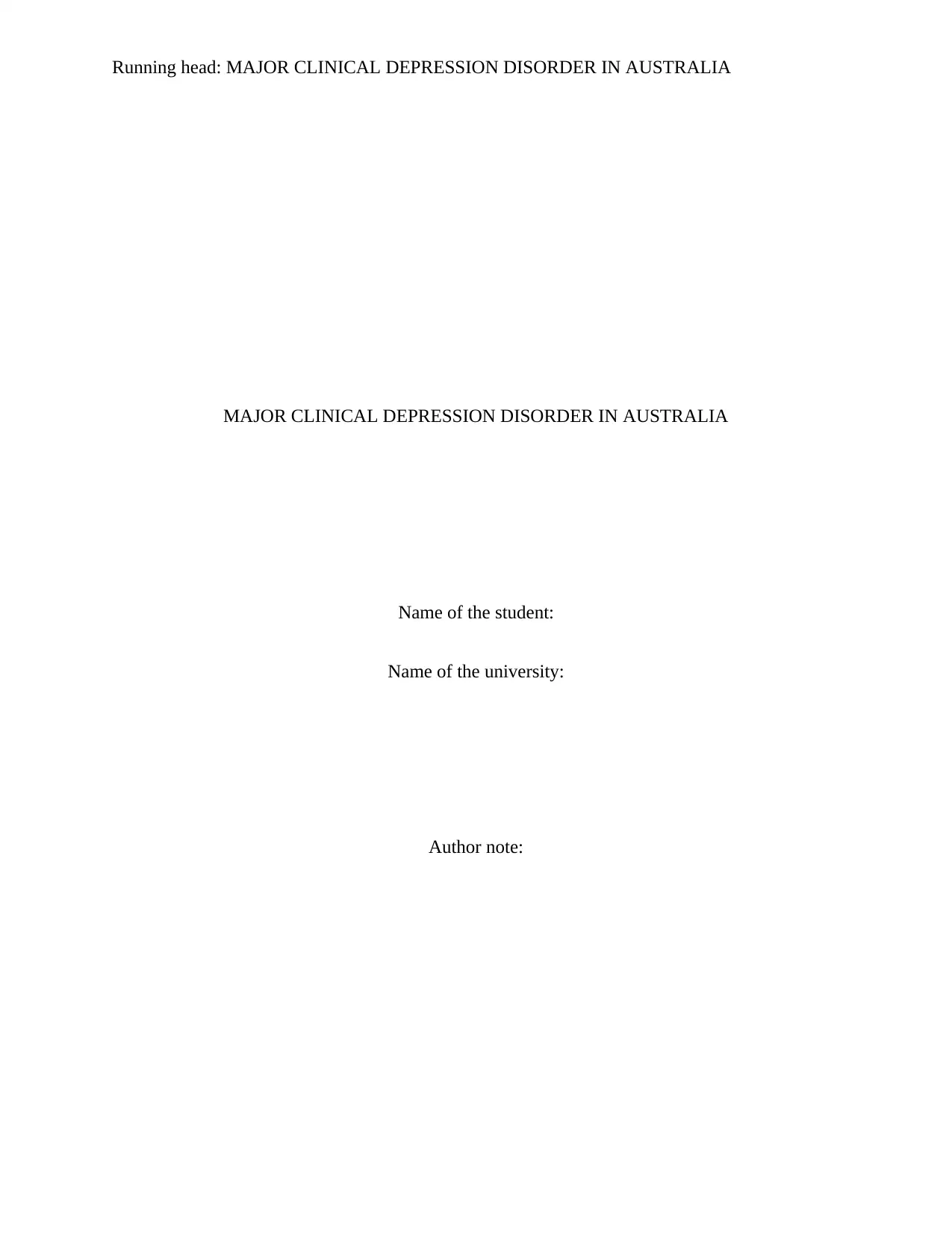
Running head: MAJOR CLINICAL DEPRESSION DISORDER IN AUSTRALIA
MAJOR CLINICAL DEPRESSION DISORDER IN AUSTRALIA
Name of the student:
Name of the university:
Author note:
MAJOR CLINICAL DEPRESSION DISORDER IN AUSTRALIA
Name of the student:
Name of the university:
Author note:
Secure Best Marks with AI Grader
Need help grading? Try our AI Grader for instant feedback on your assignments.
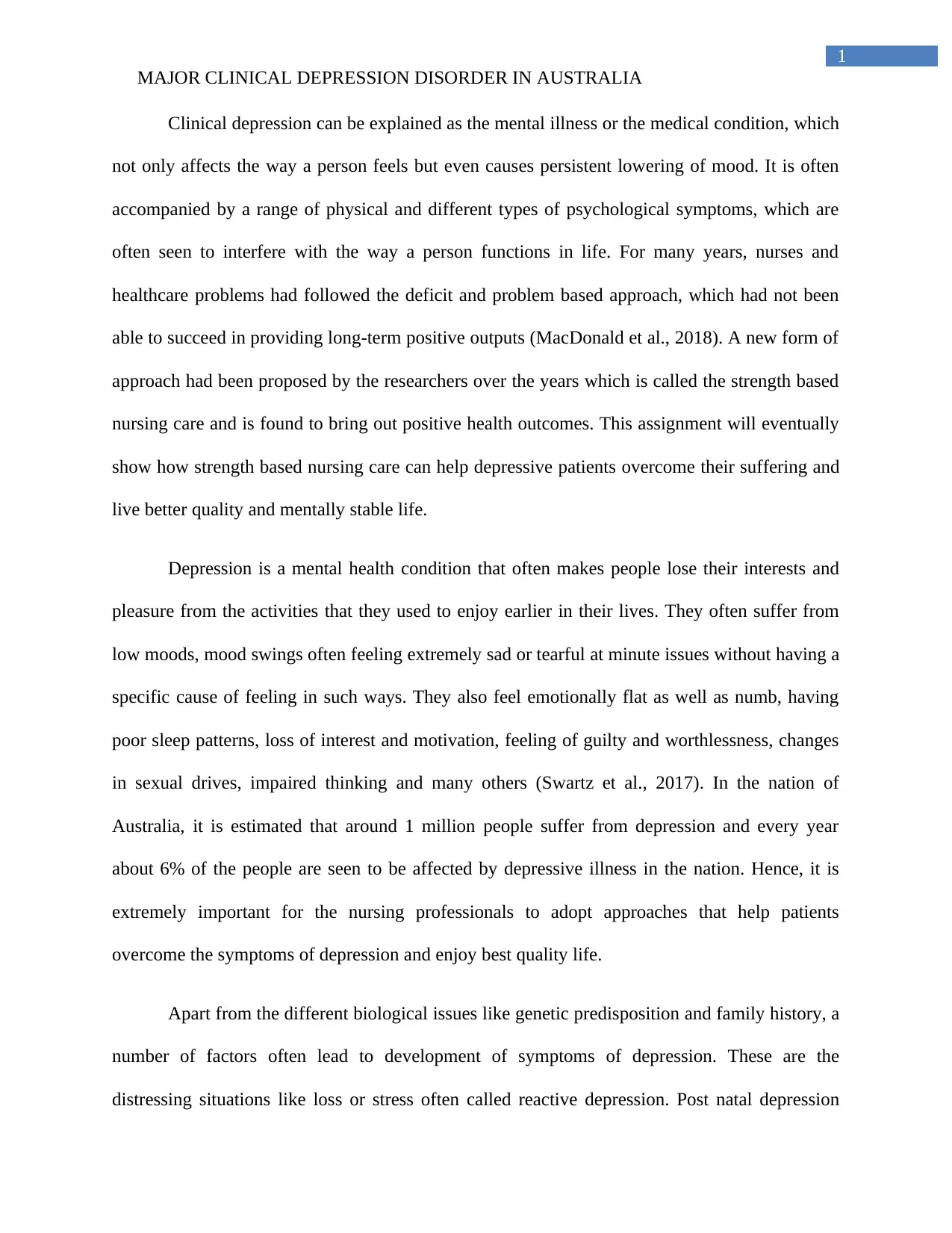
1
MAJOR CLINICAL DEPRESSION DISORDER IN AUSTRALIA
Clinical depression can be explained as the mental illness or the medical condition, which
not only affects the way a person feels but even causes persistent lowering of mood. It is often
accompanied by a range of physical and different types of psychological symptoms, which are
often seen to interfere with the way a person functions in life. For many years, nurses and
healthcare problems had followed the deficit and problem based approach, which had not been
able to succeed in providing long-term positive outputs (MacDonald et al., 2018). A new form of
approach had been proposed by the researchers over the years which is called the strength based
nursing care and is found to bring out positive health outcomes. This assignment will eventually
show how strength based nursing care can help depressive patients overcome their suffering and
live better quality and mentally stable life.
Depression is a mental health condition that often makes people lose their interests and
pleasure from the activities that they used to enjoy earlier in their lives. They often suffer from
low moods, mood swings often feeling extremely sad or tearful at minute issues without having a
specific cause of feeling in such ways. They also feel emotionally flat as well as numb, having
poor sleep patterns, loss of interest and motivation, feeling of guilty and worthlessness, changes
in sexual drives, impaired thinking and many others (Swartz et al., 2017). In the nation of
Australia, it is estimated that around 1 million people suffer from depression and every year
about 6% of the people are seen to be affected by depressive illness in the nation. Hence, it is
extremely important for the nursing professionals to adopt approaches that help patients
overcome the symptoms of depression and enjoy best quality life.
Apart from the different biological issues like genetic predisposition and family history, a
number of factors often lead to development of symptoms of depression. These are the
distressing situations like loss or stress often called reactive depression. Post natal depression
MAJOR CLINICAL DEPRESSION DISORDER IN AUSTRALIA
Clinical depression can be explained as the mental illness or the medical condition, which
not only affects the way a person feels but even causes persistent lowering of mood. It is often
accompanied by a range of physical and different types of psychological symptoms, which are
often seen to interfere with the way a person functions in life. For many years, nurses and
healthcare problems had followed the deficit and problem based approach, which had not been
able to succeed in providing long-term positive outputs (MacDonald et al., 2018). A new form of
approach had been proposed by the researchers over the years which is called the strength based
nursing care and is found to bring out positive health outcomes. This assignment will eventually
show how strength based nursing care can help depressive patients overcome their suffering and
live better quality and mentally stable life.
Depression is a mental health condition that often makes people lose their interests and
pleasure from the activities that they used to enjoy earlier in their lives. They often suffer from
low moods, mood swings often feeling extremely sad or tearful at minute issues without having a
specific cause of feeling in such ways. They also feel emotionally flat as well as numb, having
poor sleep patterns, loss of interest and motivation, feeling of guilty and worthlessness, changes
in sexual drives, impaired thinking and many others (Swartz et al., 2017). In the nation of
Australia, it is estimated that around 1 million people suffer from depression and every year
about 6% of the people are seen to be affected by depressive illness in the nation. Hence, it is
extremely important for the nursing professionals to adopt approaches that help patients
overcome the symptoms of depression and enjoy best quality life.
Apart from the different biological issues like genetic predisposition and family history, a
number of factors often lead to development of symptoms of depression. These are the
distressing situations like loss or stress often called reactive depression. Post natal depression
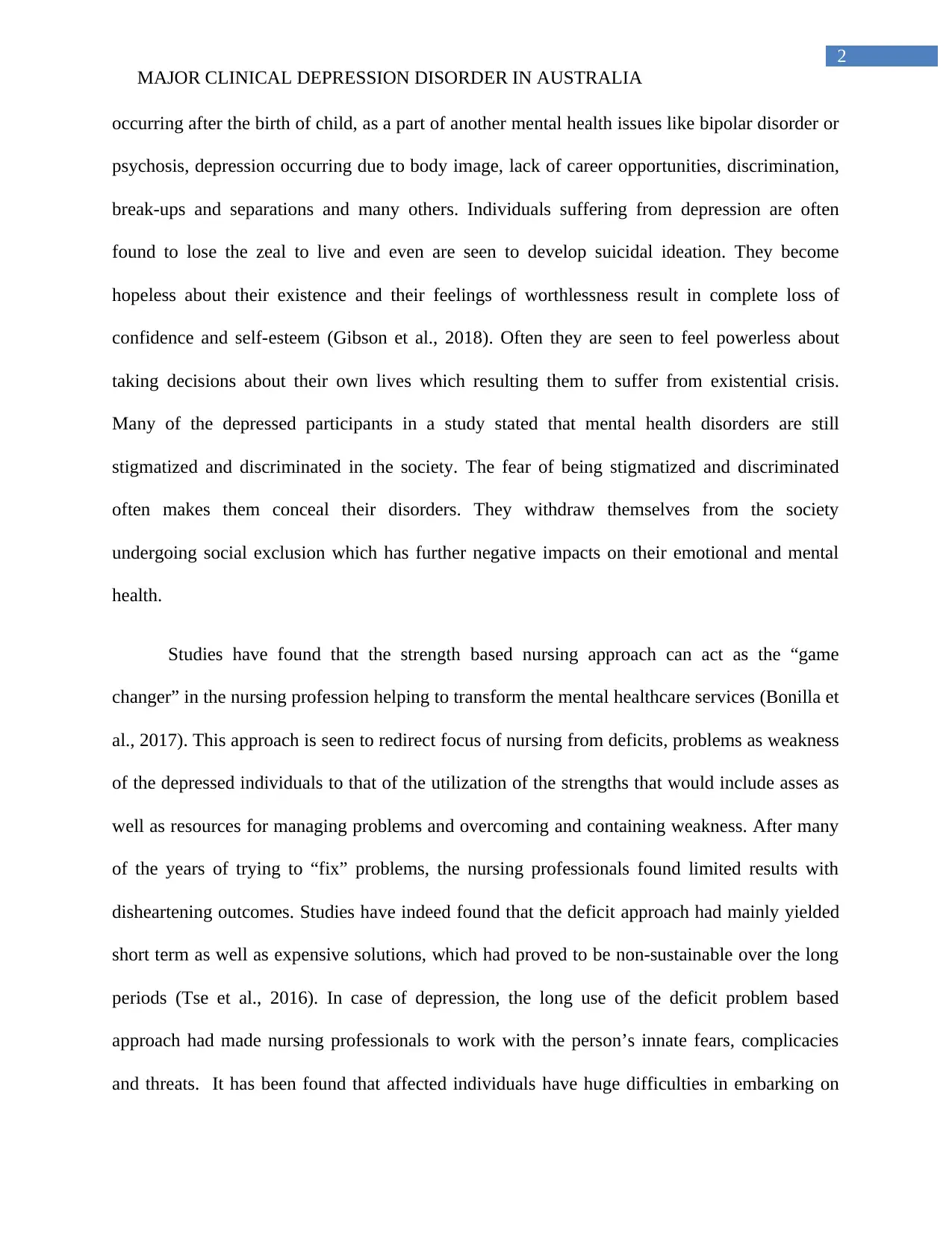
2
MAJOR CLINICAL DEPRESSION DISORDER IN AUSTRALIA
occurring after the birth of child, as a part of another mental health issues like bipolar disorder or
psychosis, depression occurring due to body image, lack of career opportunities, discrimination,
break-ups and separations and many others. Individuals suffering from depression are often
found to lose the zeal to live and even are seen to develop suicidal ideation. They become
hopeless about their existence and their feelings of worthlessness result in complete loss of
confidence and self-esteem (Gibson et al., 2018). Often they are seen to feel powerless about
taking decisions about their own lives which resulting them to suffer from existential crisis.
Many of the depressed participants in a study stated that mental health disorders are still
stigmatized and discriminated in the society. The fear of being stigmatized and discriminated
often makes them conceal their disorders. They withdraw themselves from the society
undergoing social exclusion which has further negative impacts on their emotional and mental
health.
Studies have found that the strength based nursing approach can act as the “game
changer” in the nursing profession helping to transform the mental healthcare services (Bonilla et
al., 2017). This approach is seen to redirect focus of nursing from deficits, problems as weakness
of the depressed individuals to that of the utilization of the strengths that would include asses as
well as resources for managing problems and overcoming and containing weakness. After many
of the years of trying to “fix” problems, the nursing professionals found limited results with
disheartening outcomes. Studies have indeed found that the deficit approach had mainly yielded
short term as well as expensive solutions, which had proved to be non-sustainable over the long
periods (Tse et al., 2016). In case of depression, the long use of the deficit problem based
approach had made nursing professionals to work with the person’s innate fears, complicacies
and threats. It has been found that affected individuals have huge difficulties in embarking on
MAJOR CLINICAL DEPRESSION DISORDER IN AUSTRALIA
occurring after the birth of child, as a part of another mental health issues like bipolar disorder or
psychosis, depression occurring due to body image, lack of career opportunities, discrimination,
break-ups and separations and many others. Individuals suffering from depression are often
found to lose the zeal to live and even are seen to develop suicidal ideation. They become
hopeless about their existence and their feelings of worthlessness result in complete loss of
confidence and self-esteem (Gibson et al., 2018). Often they are seen to feel powerless about
taking decisions about their own lives which resulting them to suffer from existential crisis.
Many of the depressed participants in a study stated that mental health disorders are still
stigmatized and discriminated in the society. The fear of being stigmatized and discriminated
often makes them conceal their disorders. They withdraw themselves from the society
undergoing social exclusion which has further negative impacts on their emotional and mental
health.
Studies have found that the strength based nursing approach can act as the “game
changer” in the nursing profession helping to transform the mental healthcare services (Bonilla et
al., 2017). This approach is seen to redirect focus of nursing from deficits, problems as weakness
of the depressed individuals to that of the utilization of the strengths that would include asses as
well as resources for managing problems and overcoming and containing weakness. After many
of the years of trying to “fix” problems, the nursing professionals found limited results with
disheartening outcomes. Studies have indeed found that the deficit approach had mainly yielded
short term as well as expensive solutions, which had proved to be non-sustainable over the long
periods (Tse et al., 2016). In case of depression, the long use of the deficit problem based
approach had made nursing professionals to work with the person’s innate fears, complicacies
and threats. It has been found that affected individuals have huge difficulties in embarking on
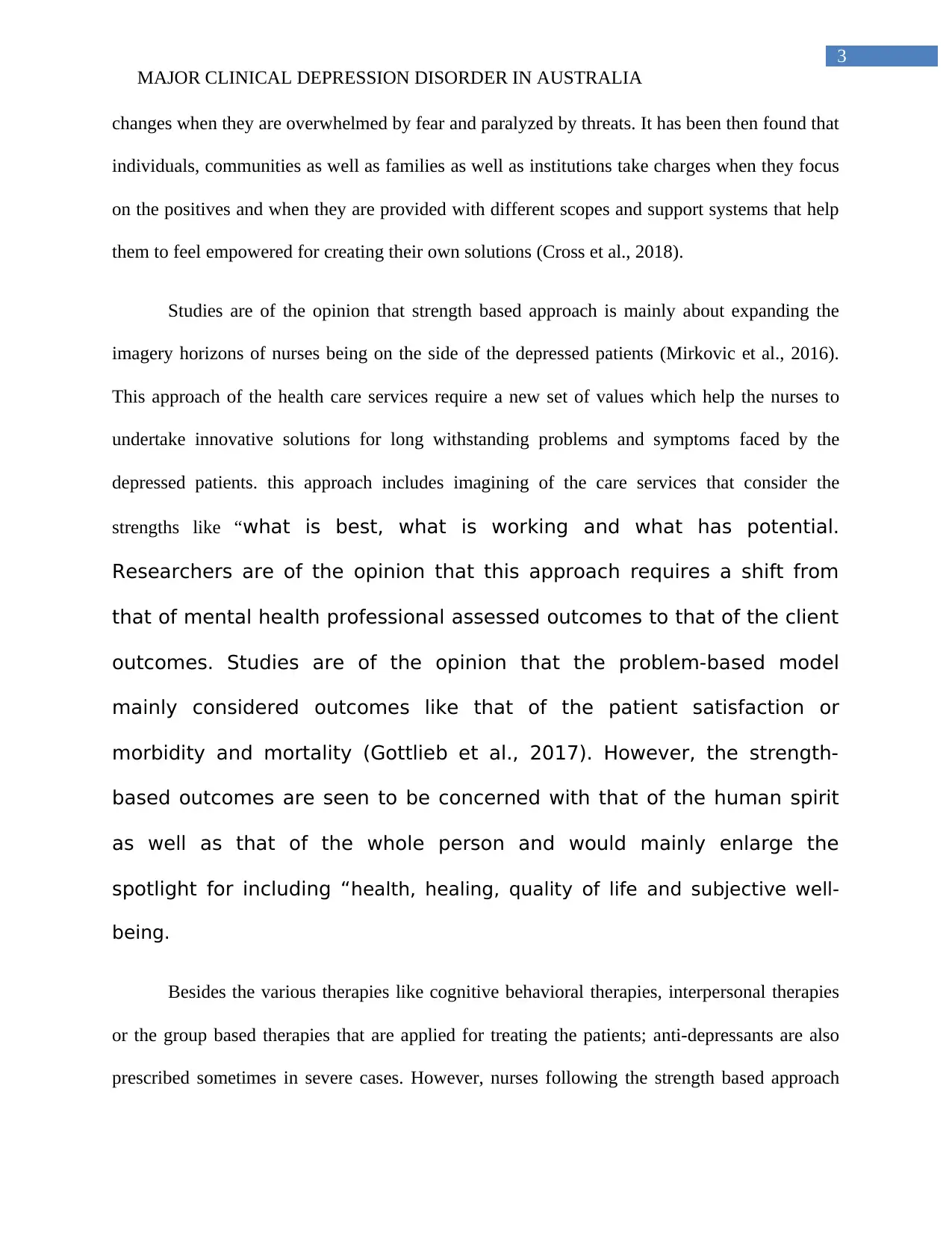
3
MAJOR CLINICAL DEPRESSION DISORDER IN AUSTRALIA
changes when they are overwhelmed by fear and paralyzed by threats. It has been then found that
individuals, communities as well as families as well as institutions take charges when they focus
on the positives and when they are provided with different scopes and support systems that help
them to feel empowered for creating their own solutions (Cross et al., 2018).
Studies are of the opinion that strength based approach is mainly about expanding the
imagery horizons of nurses being on the side of the depressed patients (Mirkovic et al., 2016).
This approach of the health care services require a new set of values which help the nurses to
undertake innovative solutions for long withstanding problems and symptoms faced by the
depressed patients. this approach includes imagining of the care services that consider the
strengths like “what is best, what is working and what has potential.
Researchers are of the opinion that this approach requires a shift from
that of mental health professional assessed outcomes to that of the client
outcomes. Studies are of the opinion that the problem-based model
mainly considered outcomes like that of the patient satisfaction or
morbidity and mortality (Gottlieb et al., 2017). However, the strength-
based outcomes are seen to be concerned with that of the human spirit
as well as that of the whole person and would mainly enlarge the
spotlight for including “health, healing, quality of life and subjective well-
being.
Besides the various therapies like cognitive behavioral therapies, interpersonal therapies
or the group based therapies that are applied for treating the patients; anti-depressants are also
prescribed sometimes in severe cases. However, nurses following the strength based approach
MAJOR CLINICAL DEPRESSION DISORDER IN AUSTRALIA
changes when they are overwhelmed by fear and paralyzed by threats. It has been then found that
individuals, communities as well as families as well as institutions take charges when they focus
on the positives and when they are provided with different scopes and support systems that help
them to feel empowered for creating their own solutions (Cross et al., 2018).
Studies are of the opinion that strength based approach is mainly about expanding the
imagery horizons of nurses being on the side of the depressed patients (Mirkovic et al., 2016).
This approach of the health care services require a new set of values which help the nurses to
undertake innovative solutions for long withstanding problems and symptoms faced by the
depressed patients. this approach includes imagining of the care services that consider the
strengths like “what is best, what is working and what has potential.
Researchers are of the opinion that this approach requires a shift from
that of mental health professional assessed outcomes to that of the client
outcomes. Studies are of the opinion that the problem-based model
mainly considered outcomes like that of the patient satisfaction or
morbidity and mortality (Gottlieb et al., 2017). However, the strength-
based outcomes are seen to be concerned with that of the human spirit
as well as that of the whole person and would mainly enlarge the
spotlight for including “health, healing, quality of life and subjective well-
being.
Besides the various therapies like cognitive behavioral therapies, interpersonal therapies
or the group based therapies that are applied for treating the patients; anti-depressants are also
prescribed sometimes in severe cases. However, nurses following the strength based approach
Secure Best Marks with AI Grader
Need help grading? Try our AI Grader for instant feedback on your assignments.
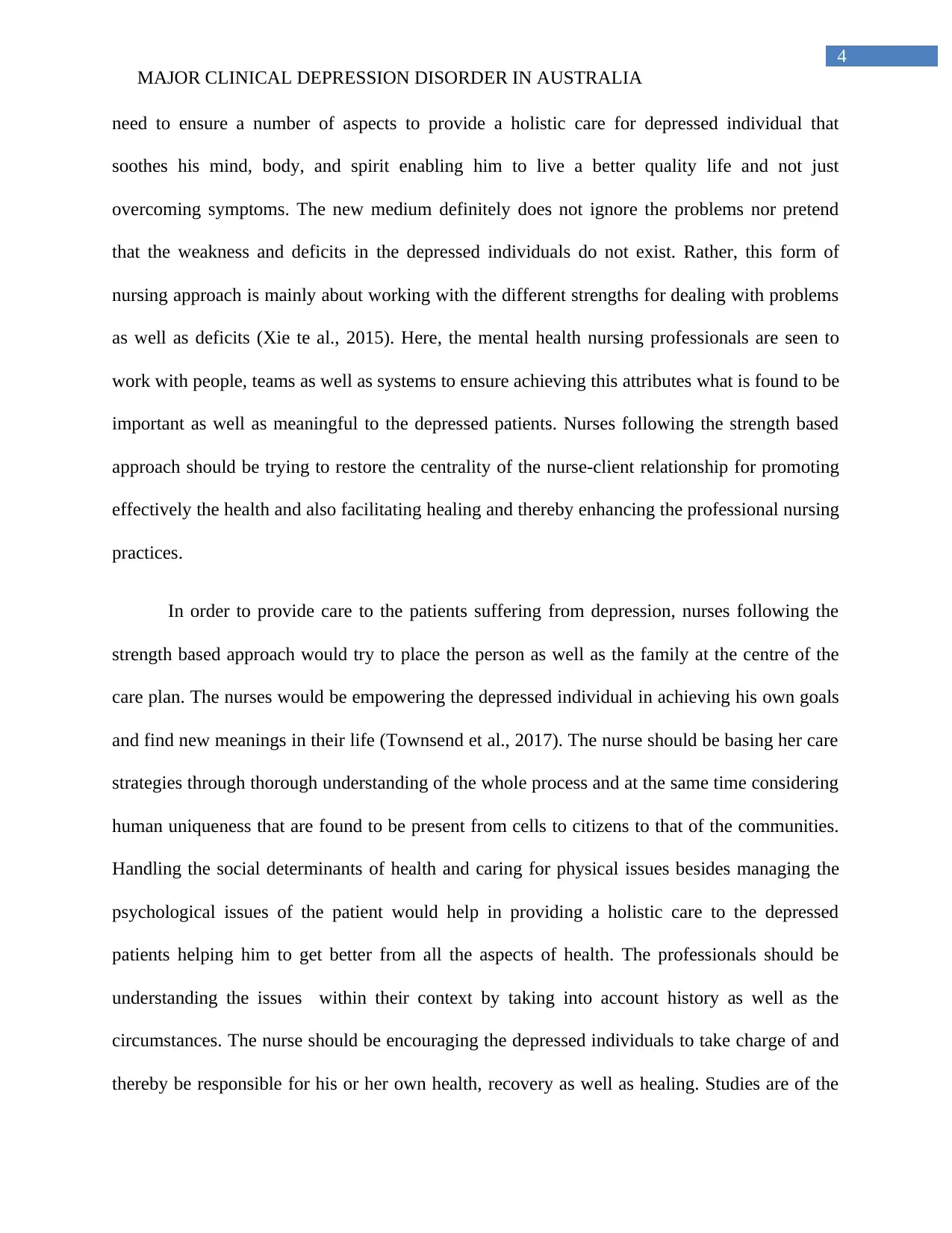
4
MAJOR CLINICAL DEPRESSION DISORDER IN AUSTRALIA
need to ensure a number of aspects to provide a holistic care for depressed individual that
soothes his mind, body, and spirit enabling him to live a better quality life and not just
overcoming symptoms. The new medium definitely does not ignore the problems nor pretend
that the weakness and deficits in the depressed individuals do not exist. Rather, this form of
nursing approach is mainly about working with the different strengths for dealing with problems
as well as deficits (Xie te al., 2015). Here, the mental health nursing professionals are seen to
work with people, teams as well as systems to ensure achieving this attributes what is found to be
important as well as meaningful to the depressed patients. Nurses following the strength based
approach should be trying to restore the centrality of the nurse-client relationship for promoting
effectively the health and also facilitating healing and thereby enhancing the professional nursing
practices.
In order to provide care to the patients suffering from depression, nurses following the
strength based approach would try to place the person as well as the family at the centre of the
care plan. The nurses would be empowering the depressed individual in achieving his own goals
and find new meanings in their life (Townsend et al., 2017). The nurse should be basing her care
strategies through thorough understanding of the whole process and at the same time considering
human uniqueness that are found to be present from cells to citizens to that of the communities.
Handling the social determinants of health and caring for physical issues besides managing the
psychological issues of the patient would help in providing a holistic care to the depressed
patients helping him to get better from all the aspects of health. The professionals should be
understanding the issues within their context by taking into account history as well as the
circumstances. The nurse should be encouraging the depressed individuals to take charge of and
thereby be responsible for his or her own health, recovery as well as healing. Studies are of the
MAJOR CLINICAL DEPRESSION DISORDER IN AUSTRALIA
need to ensure a number of aspects to provide a holistic care for depressed individual that
soothes his mind, body, and spirit enabling him to live a better quality life and not just
overcoming symptoms. The new medium definitely does not ignore the problems nor pretend
that the weakness and deficits in the depressed individuals do not exist. Rather, this form of
nursing approach is mainly about working with the different strengths for dealing with problems
as well as deficits (Xie te al., 2015). Here, the mental health nursing professionals are seen to
work with people, teams as well as systems to ensure achieving this attributes what is found to be
important as well as meaningful to the depressed patients. Nurses following the strength based
approach should be trying to restore the centrality of the nurse-client relationship for promoting
effectively the health and also facilitating healing and thereby enhancing the professional nursing
practices.
In order to provide care to the patients suffering from depression, nurses following the
strength based approach would try to place the person as well as the family at the centre of the
care plan. The nurses would be empowering the depressed individual in achieving his own goals
and find new meanings in their life (Townsend et al., 2017). The nurse should be basing her care
strategies through thorough understanding of the whole process and at the same time considering
human uniqueness that are found to be present from cells to citizens to that of the communities.
Handling the social determinants of health and caring for physical issues besides managing the
psychological issues of the patient would help in providing a holistic care to the depressed
patients helping him to get better from all the aspects of health. The professionals should be
understanding the issues within their context by taking into account history as well as the
circumstances. The nurse should be encouraging the depressed individuals to take charge of and
thereby be responsible for his or her own health, recovery as well as healing. Studies are of the
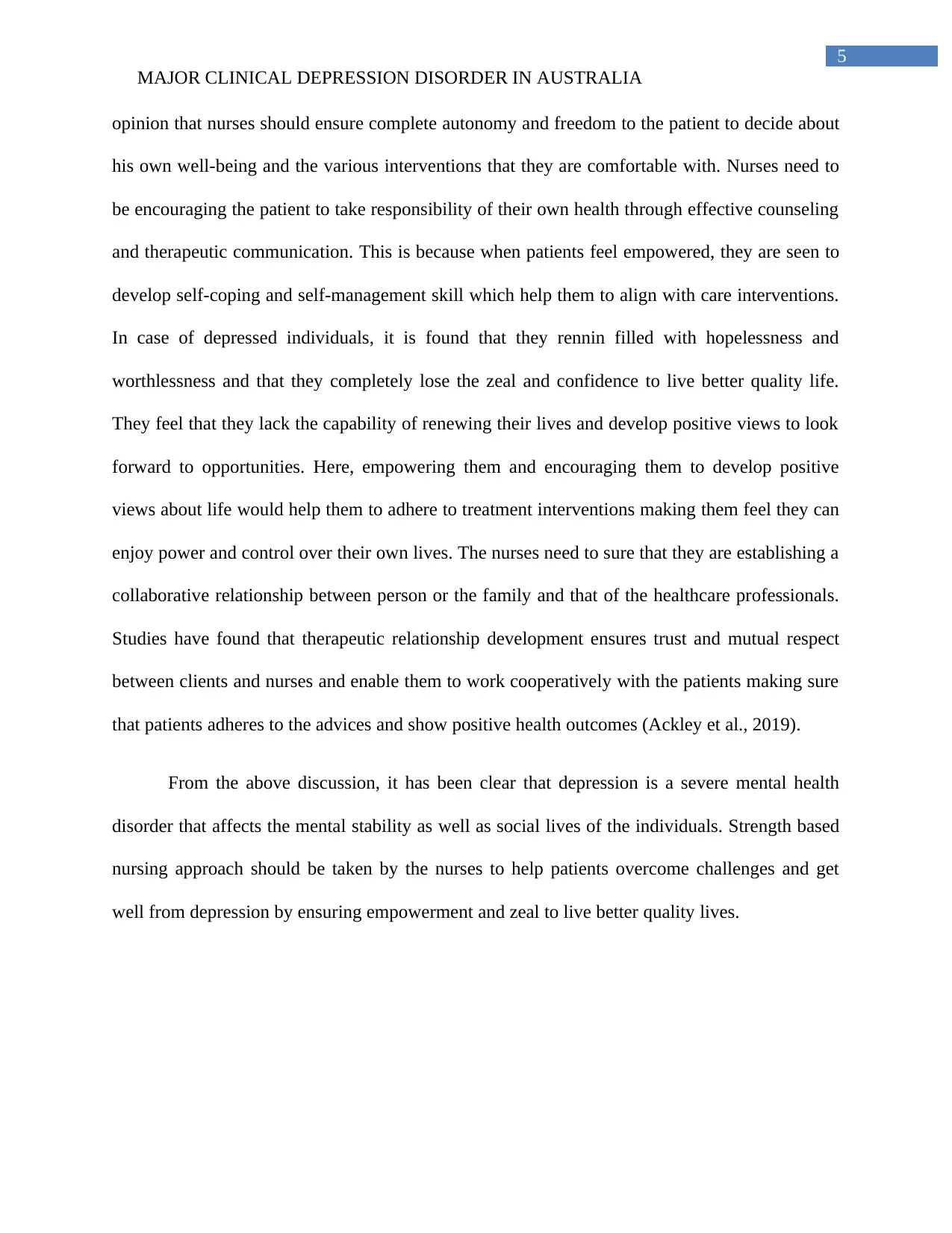
5
MAJOR CLINICAL DEPRESSION DISORDER IN AUSTRALIA
opinion that nurses should ensure complete autonomy and freedom to the patient to decide about
his own well-being and the various interventions that they are comfortable with. Nurses need to
be encouraging the patient to take responsibility of their own health through effective counseling
and therapeutic communication. This is because when patients feel empowered, they are seen to
develop self-coping and self-management skill which help them to align with care interventions.
In case of depressed individuals, it is found that they rennin filled with hopelessness and
worthlessness and that they completely lose the zeal and confidence to live better quality life.
They feel that they lack the capability of renewing their lives and develop positive views to look
forward to opportunities. Here, empowering them and encouraging them to develop positive
views about life would help them to adhere to treatment interventions making them feel they can
enjoy power and control over their own lives. The nurses need to sure that they are establishing a
collaborative relationship between person or the family and that of the healthcare professionals.
Studies have found that therapeutic relationship development ensures trust and mutual respect
between clients and nurses and enable them to work cooperatively with the patients making sure
that patients adheres to the advices and show positive health outcomes (Ackley et al., 2019).
From the above discussion, it has been clear that depression is a severe mental health
disorder that affects the mental stability as well as social lives of the individuals. Strength based
nursing approach should be taken by the nurses to help patients overcome challenges and get
well from depression by ensuring empowerment and zeal to live better quality lives.
MAJOR CLINICAL DEPRESSION DISORDER IN AUSTRALIA
opinion that nurses should ensure complete autonomy and freedom to the patient to decide about
his own well-being and the various interventions that they are comfortable with. Nurses need to
be encouraging the patient to take responsibility of their own health through effective counseling
and therapeutic communication. This is because when patients feel empowered, they are seen to
develop self-coping and self-management skill which help them to align with care interventions.
In case of depressed individuals, it is found that they rennin filled with hopelessness and
worthlessness and that they completely lose the zeal and confidence to live better quality life.
They feel that they lack the capability of renewing their lives and develop positive views to look
forward to opportunities. Here, empowering them and encouraging them to develop positive
views about life would help them to adhere to treatment interventions making them feel they can
enjoy power and control over their own lives. The nurses need to sure that they are establishing a
collaborative relationship between person or the family and that of the healthcare professionals.
Studies have found that therapeutic relationship development ensures trust and mutual respect
between clients and nurses and enable them to work cooperatively with the patients making sure
that patients adheres to the advices and show positive health outcomes (Ackley et al., 2019).
From the above discussion, it has been clear that depression is a severe mental health
disorder that affects the mental stability as well as social lives of the individuals. Strength based
nursing approach should be taken by the nurses to help patients overcome challenges and get
well from depression by ensuring empowerment and zeal to live better quality lives.
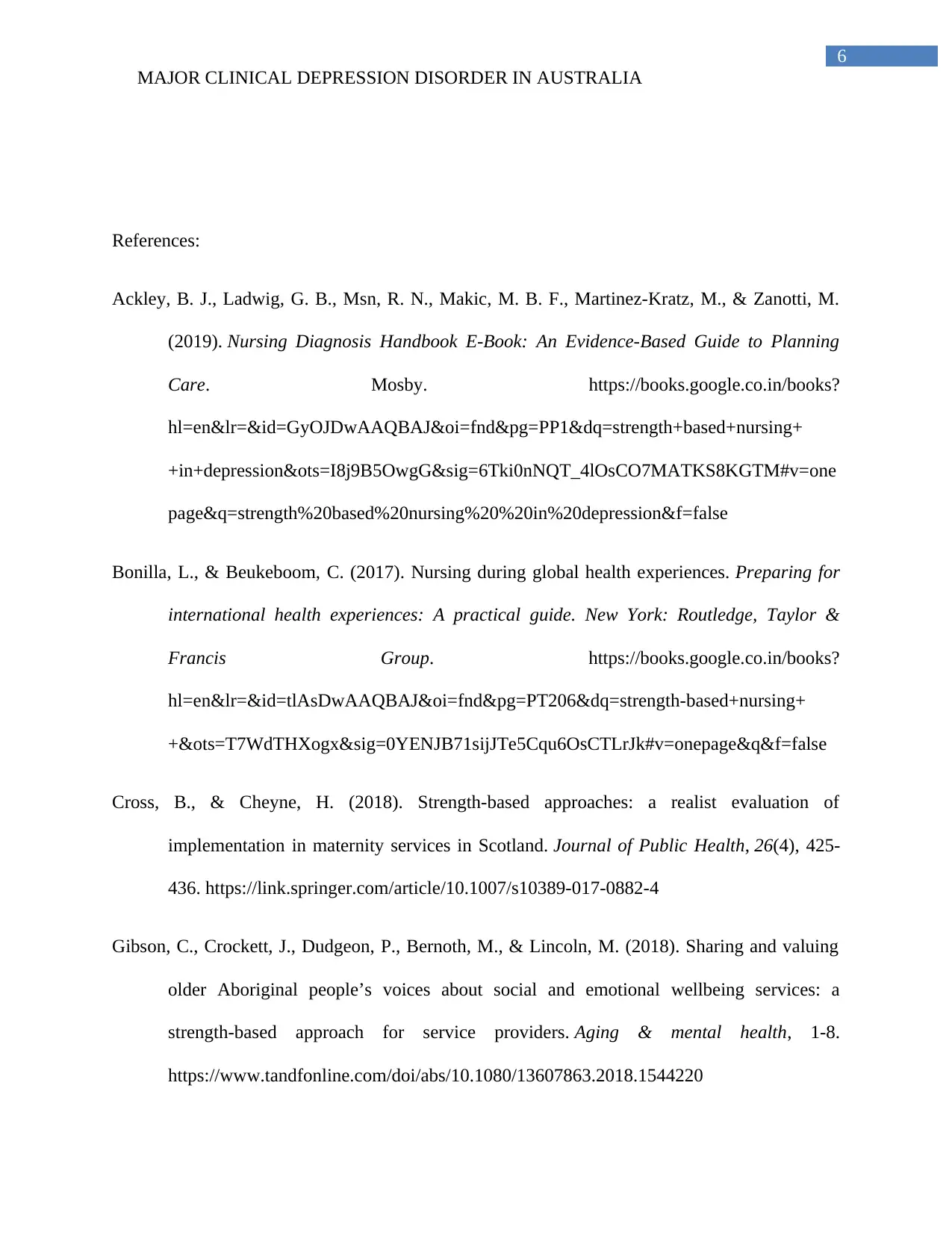
6
MAJOR CLINICAL DEPRESSION DISORDER IN AUSTRALIA
References:
Ackley, B. J., Ladwig, G. B., Msn, R. N., Makic, M. B. F., Martinez-Kratz, M., & Zanotti, M.
(2019). Nursing Diagnosis Handbook E-Book: An Evidence-Based Guide to Planning
Care. Mosby. https://books.google.co.in/books?
hl=en&lr=&id=GyOJDwAAQBAJ&oi=fnd&pg=PP1&dq=strength+based+nursing+
+in+depression&ots=I8j9B5OwgG&sig=6Tki0nNQT_4lOsCO7MATKS8KGTM#v=one
page&q=strength%20based%20nursing%20%20in%20depression&f=false
Bonilla, L., & Beukeboom, C. (2017). Nursing during global health experiences. Preparing for
international health experiences: A practical guide. New York: Routledge, Taylor &
Francis Group. https://books.google.co.in/books?
hl=en&lr=&id=tlAsDwAAQBAJ&oi=fnd&pg=PT206&dq=strength-based+nursing+
+&ots=T7WdTHXogx&sig=0YENJB71sijJTe5Cqu6OsCTLrJk#v=onepage&q&f=false
Cross, B., & Cheyne, H. (2018). Strength-based approaches: a realist evaluation of
implementation in maternity services in Scotland. Journal of Public Health, 26(4), 425-
436. https://link.springer.com/article/10.1007/s10389-017-0882-4
Gibson, C., Crockett, J., Dudgeon, P., Bernoth, M., & Lincoln, M. (2018). Sharing and valuing
older Aboriginal people’s voices about social and emotional wellbeing services: a
strength-based approach for service providers. Aging & mental health, 1-8.
https://www.tandfonline.com/doi/abs/10.1080/13607863.2018.1544220
MAJOR CLINICAL DEPRESSION DISORDER IN AUSTRALIA
References:
Ackley, B. J., Ladwig, G. B., Msn, R. N., Makic, M. B. F., Martinez-Kratz, M., & Zanotti, M.
(2019). Nursing Diagnosis Handbook E-Book: An Evidence-Based Guide to Planning
Care. Mosby. https://books.google.co.in/books?
hl=en&lr=&id=GyOJDwAAQBAJ&oi=fnd&pg=PP1&dq=strength+based+nursing+
+in+depression&ots=I8j9B5OwgG&sig=6Tki0nNQT_4lOsCO7MATKS8KGTM#v=one
page&q=strength%20based%20nursing%20%20in%20depression&f=false
Bonilla, L., & Beukeboom, C. (2017). Nursing during global health experiences. Preparing for
international health experiences: A practical guide. New York: Routledge, Taylor &
Francis Group. https://books.google.co.in/books?
hl=en&lr=&id=tlAsDwAAQBAJ&oi=fnd&pg=PT206&dq=strength-based+nursing+
+&ots=T7WdTHXogx&sig=0YENJB71sijJTe5Cqu6OsCTLrJk#v=onepage&q&f=false
Cross, B., & Cheyne, H. (2018). Strength-based approaches: a realist evaluation of
implementation in maternity services in Scotland. Journal of Public Health, 26(4), 425-
436. https://link.springer.com/article/10.1007/s10389-017-0882-4
Gibson, C., Crockett, J., Dudgeon, P., Bernoth, M., & Lincoln, M. (2018). Sharing and valuing
older Aboriginal people’s voices about social and emotional wellbeing services: a
strength-based approach for service providers. Aging & mental health, 1-8.
https://www.tandfonline.com/doi/abs/10.1080/13607863.2018.1544220
Paraphrase This Document
Need a fresh take? Get an instant paraphrase of this document with our AI Paraphraser
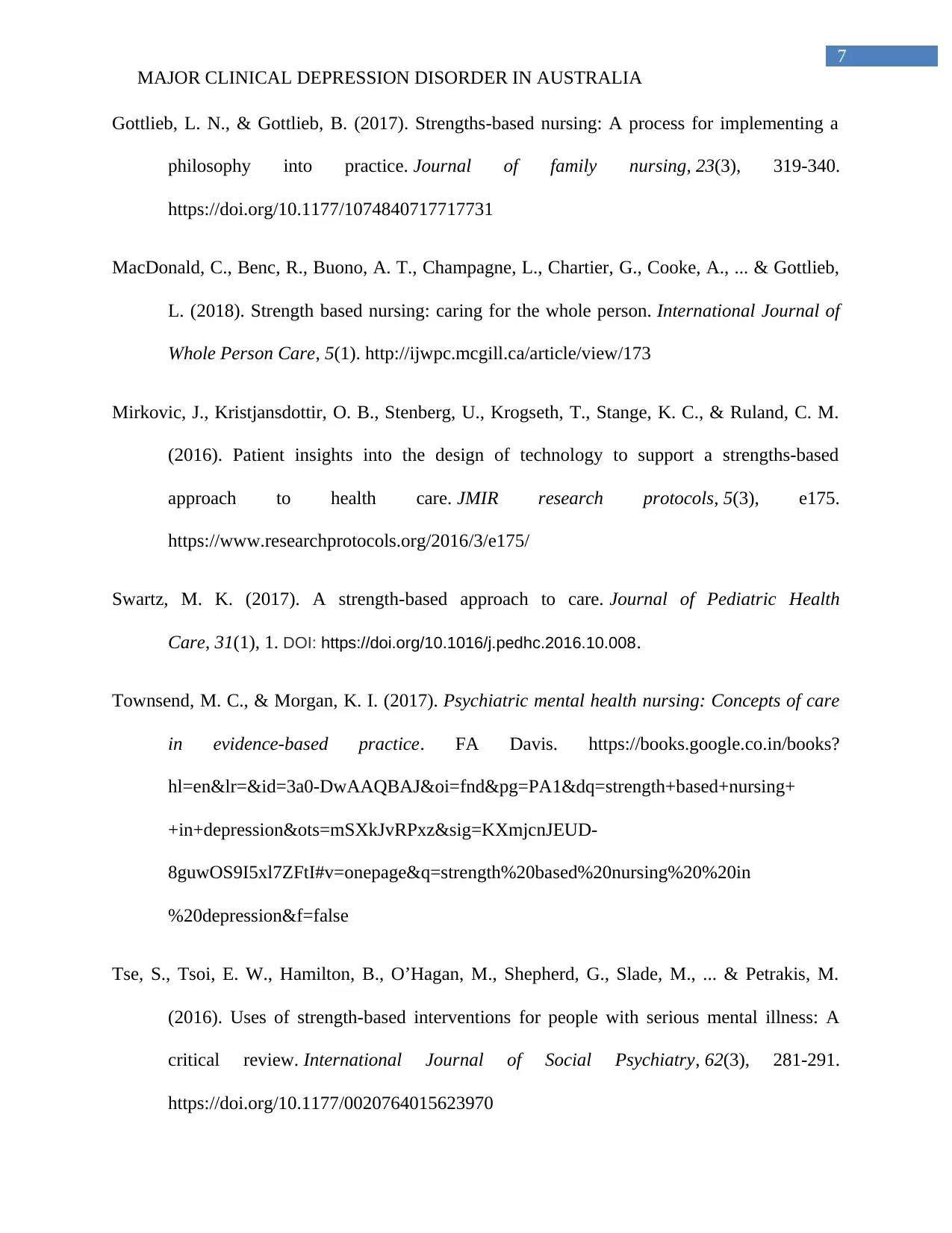
7
MAJOR CLINICAL DEPRESSION DISORDER IN AUSTRALIA
Gottlieb, L. N., & Gottlieb, B. (2017). Strengths-based nursing: A process for implementing a
philosophy into practice. Journal of family nursing, 23(3), 319-340.
https://doi.org/10.1177/1074840717717731
MacDonald, C., Benc, R., Buono, A. T., Champagne, L., Chartier, G., Cooke, A., ... & Gottlieb,
L. (2018). Strength based nursing: caring for the whole person. International Journal of
Whole Person Care, 5(1). http://ijwpc.mcgill.ca/article/view/173
Mirkovic, J., Kristjansdottir, O. B., Stenberg, U., Krogseth, T., Stange, K. C., & Ruland, C. M.
(2016). Patient insights into the design of technology to support a strengths-based
approach to health care. JMIR research protocols, 5(3), e175.
https://www.researchprotocols.org/2016/3/e175/
Swartz, M. K. (2017). A strength-based approach to care. Journal of Pediatric Health
Care, 31(1), 1. DOI: https://doi.org/10.1016/j.pedhc.2016.10.008.
Townsend, M. C., & Morgan, K. I. (2017). Psychiatric mental health nursing: Concepts of care
in evidence-based practice. FA Davis. https://books.google.co.in/books?
hl=en&lr=&id=3a0-DwAAQBAJ&oi=fnd&pg=PA1&dq=strength+based+nursing+
+in+depression&ots=mSXkJvRPxz&sig=KXmjcnJEUD-
8guwOS9I5xl7ZFtI#v=onepage&q=strength%20based%20nursing%20%20in
%20depression&f=false
Tse, S., Tsoi, E. W., Hamilton, B., O’Hagan, M., Shepherd, G., Slade, M., ... & Petrakis, M.
(2016). Uses of strength-based interventions for people with serious mental illness: A
critical review. International Journal of Social Psychiatry, 62(3), 281-291.
https://doi.org/10.1177/0020764015623970
MAJOR CLINICAL DEPRESSION DISORDER IN AUSTRALIA
Gottlieb, L. N., & Gottlieb, B. (2017). Strengths-based nursing: A process for implementing a
philosophy into practice. Journal of family nursing, 23(3), 319-340.
https://doi.org/10.1177/1074840717717731
MacDonald, C., Benc, R., Buono, A. T., Champagne, L., Chartier, G., Cooke, A., ... & Gottlieb,
L. (2018). Strength based nursing: caring for the whole person. International Journal of
Whole Person Care, 5(1). http://ijwpc.mcgill.ca/article/view/173
Mirkovic, J., Kristjansdottir, O. B., Stenberg, U., Krogseth, T., Stange, K. C., & Ruland, C. M.
(2016). Patient insights into the design of technology to support a strengths-based
approach to health care. JMIR research protocols, 5(3), e175.
https://www.researchprotocols.org/2016/3/e175/
Swartz, M. K. (2017). A strength-based approach to care. Journal of Pediatric Health
Care, 31(1), 1. DOI: https://doi.org/10.1016/j.pedhc.2016.10.008.
Townsend, M. C., & Morgan, K. I. (2017). Psychiatric mental health nursing: Concepts of care
in evidence-based practice. FA Davis. https://books.google.co.in/books?
hl=en&lr=&id=3a0-DwAAQBAJ&oi=fnd&pg=PA1&dq=strength+based+nursing+
+in+depression&ots=mSXkJvRPxz&sig=KXmjcnJEUD-
8guwOS9I5xl7ZFtI#v=onepage&q=strength%20based%20nursing%20%20in
%20depression&f=false
Tse, S., Tsoi, E. W., Hamilton, B., O’Hagan, M., Shepherd, G., Slade, M., ... & Petrakis, M.
(2016). Uses of strength-based interventions for people with serious mental illness: A
critical review. International Journal of Social Psychiatry, 62(3), 281-291.
https://doi.org/10.1177/0020764015623970
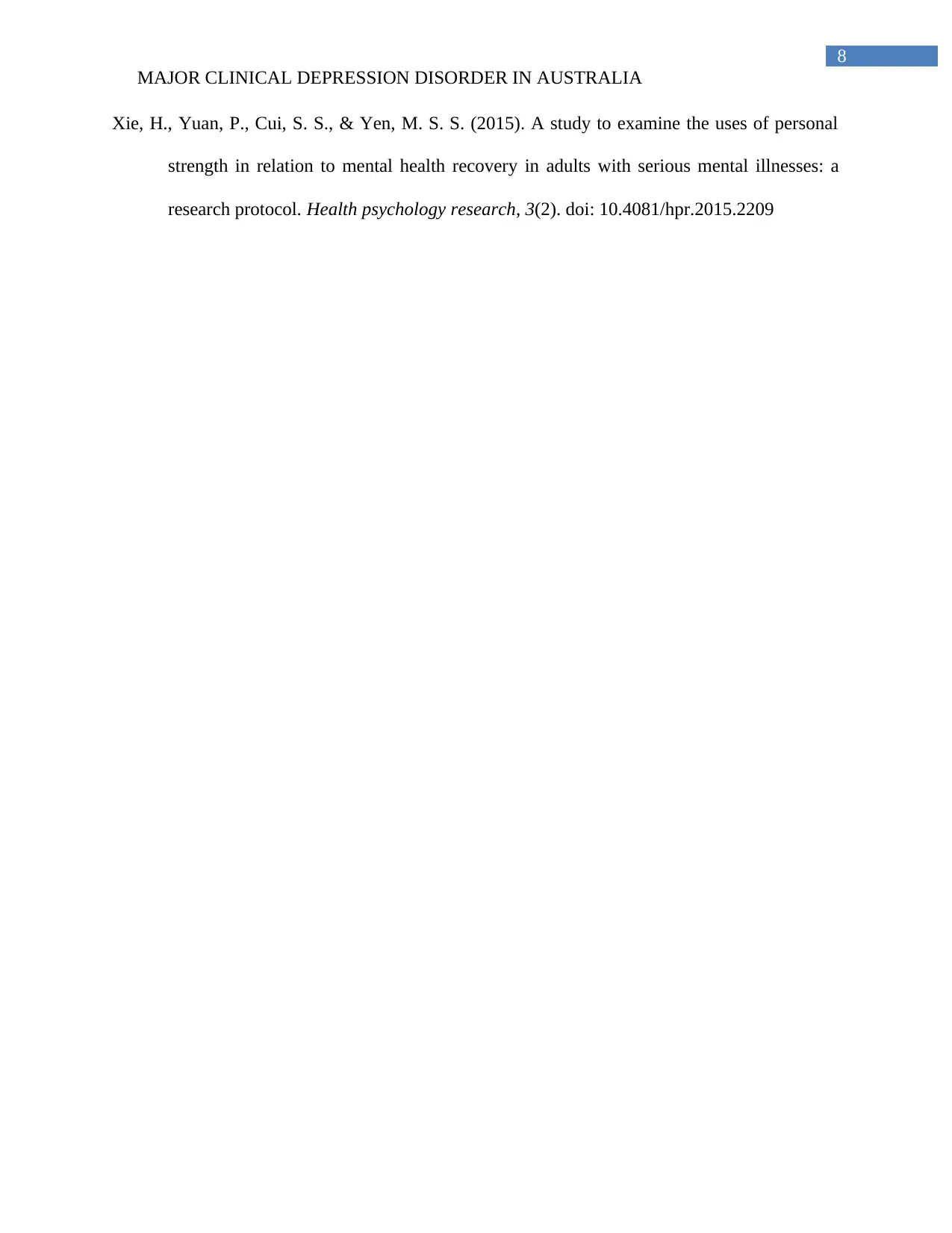
8
MAJOR CLINICAL DEPRESSION DISORDER IN AUSTRALIA
Xie, H., Yuan, P., Cui, S. S., & Yen, M. S. S. (2015). A study to examine the uses of personal
strength in relation to mental health recovery in adults with serious mental illnesses: a
research protocol. Health psychology research, 3(2). doi: 10.4081/hpr.2015.2209
MAJOR CLINICAL DEPRESSION DISORDER IN AUSTRALIA
Xie, H., Yuan, P., Cui, S. S., & Yen, M. S. S. (2015). A study to examine the uses of personal
strength in relation to mental health recovery in adults with serious mental illnesses: a
research protocol. Health psychology research, 3(2). doi: 10.4081/hpr.2015.2209
1 out of 9
Related Documents
Your All-in-One AI-Powered Toolkit for Academic Success.
+13062052269
info@desklib.com
Available 24*7 on WhatsApp / Email
![[object Object]](/_next/static/media/star-bottom.7253800d.svg)
Unlock your academic potential
© 2024 | Zucol Services PVT LTD | All rights reserved.





